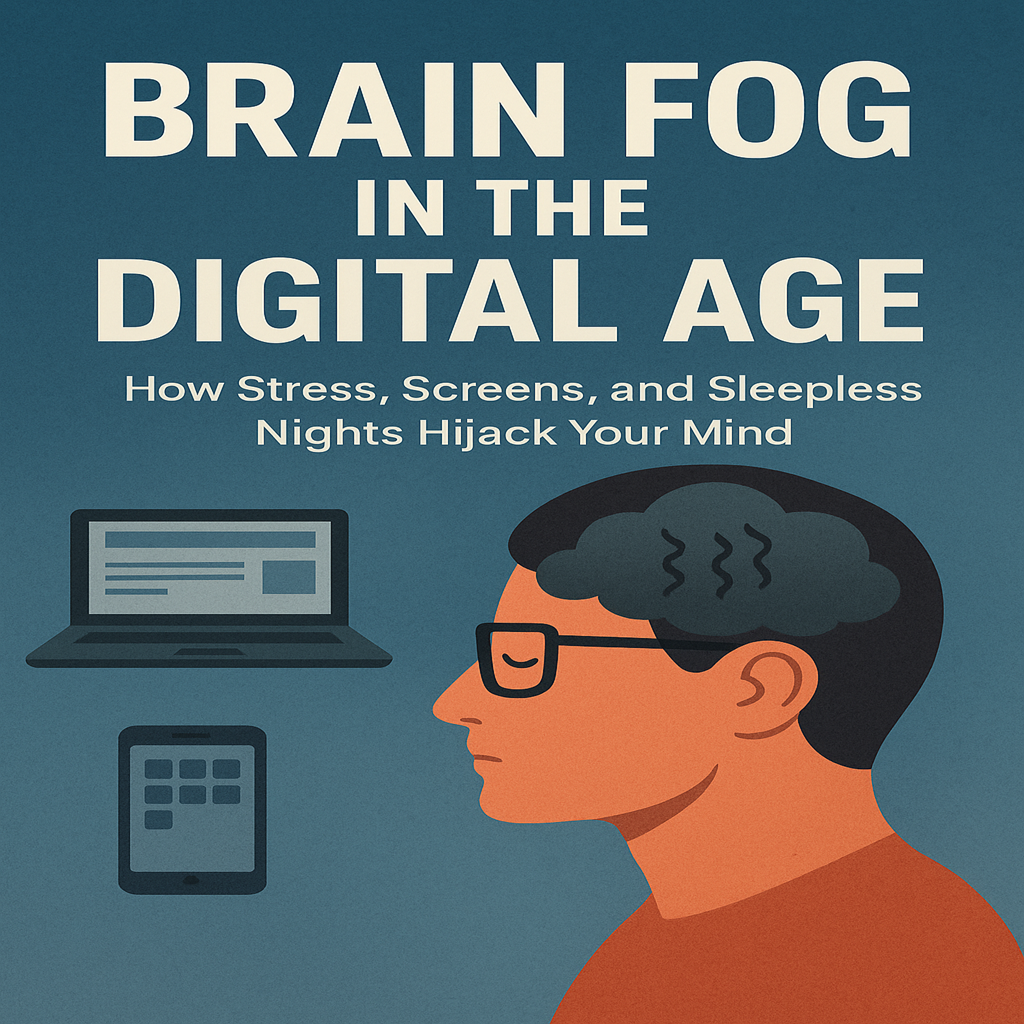
The Invisible Cloud Over the Mind
Have you ever opened your laptop, stared at the glowing screen, and realized you couldn’t remember why you sat down in the first place? Or walked into a room and forgotten your purpose for being there? That hazy, sluggish mental state has a name: brain fog. Unlike diseases with clear definitions, brain fog is a subjective but real phenomenon. People describe it as mental fatigue, difficulty focusing, forgetfulness, or a general sense of being “off.”
Brain fog isn’t a medical diagnosis, but rather a symptom of the times we live in. In our fast-paced, screen-heavy, stress-filled modern world,brain fog has quietly become the invisible epidemic. The culprits are often interconnected stress, digital overstimulation, and sleep deprivation each feeding into the other to create a cycle of mental exhaustion.
This article explores brain fog in depth: its causes, its connection to our modern lifestyle, and the practical steps to reclaim mental clarity.
What Exactly Is Brain Fog?
Brain fog is not about intelligence. It’s not that you lack ability, creativity, or memory. Rather, it’s a temporary disruption in mental sharpness. Imagine trying to tune into a radio station but constantly hearing static in the background—that’s brain fog.
Common experiences include:
- Trouble concentrating
- Slower processing of information
- Forgetfulness of everyday tasks
- Lack of mental energy
- A sense of detachment or disorientation
While short-term fog may happen after a late night or stressful day, chronic brain fog signals a deeper imbalance in lifestyle. And that’s where stress, screens, and sleep deprivation play their roles
Learn more about Therapeutic Interventions and how can How to heal your past life trauma?
The Role of Stress: Cortisol and Cognitive Overload
1. Reopening Old Wounds
Stress is a survival mechanism—but in excess, it becomes toxic. When the brain perceives stress, it releases cortisol, the hormone designed to help us fight or flee danger.
In small doses, cortisol sharpens focus. But when stress becomes chronic—deadlines, bills, social pressures—the brain remains on high alert. Elevated cortisol over long periods:
- Disrupts memory formation in the hippocampus
- Weakens the prefrontal cortex, responsible for decision-making
- Interferes with sleep quality
- Fuels anxiety, which further clouds thinking
This creates a vicious loop: stress → poor cognition → mistakes → more stress. In a world where work emails follow us into bed, stress never seems to clock out.
Screens and Digital Overload: The Price of Constant Connectivity
Screens dominate modern life: laptops for work, smartphones for communication, tablets for leisure, and TVs for relaxation. While technology connects us, it also bombards the brain with stimuli.
- Blue Light and Circadian Rhythm Disruption
Blue light from screens mimics daylight, tricking the brain into believing it’s daytime. This suppresses melatonin—the sleep hormone—and leads to delayed sleep, restless nights, and daytime fatigue. - Cognitive Overstimulation
Endless notifications, social media feeds, and multitasking tax the brain’s attention system. Our working memory, which holds small amounts of information for immediate use, becomes overloaded. - Dopamine Loops
Social media is engineered for dopamine hits. Each like, comment, or message delivers a micro-dose of reward, keeping users hooked. But constant dopamine spikes desensitize the brain, eading to restlessness and difficulty focusing on deep tasks.
The result? The brain operates in “fragmented attention mode,” never truly resting, never truly focusing.
Sleep Deprivation: The Hidden Thief of Mental Clarity
If stress is the fire and screens are the fuel, then sleep deprivation is the oxygen that keeps brain fog burning.
Adults need 7–9 hours of restorative sleep, yet modern lifestyles cut into this sacred time. Whether it’s staying up scrolling TikTok or waking up at 3 a.m. with work anxiety, sleep disruption robs the brain of its natural repair process.
During deep sleep:
- The glymphatic system clears out toxins from brain cells.
- Memories are consolidated from short-term to long-term storage.
- Emotional regulation resets for the next day.
Without quality sleep, cognitive function collapses. People experience slowed reaction times, poor problem-solving, and that unmistakable “mental cloudiness.”
The Vicious Cycle: Stress, Screens, and Sleep
The true challenge is not just one factor, but their interconnectedness:
- Stress pushes people to overuse screens for distraction (doomscrolling).
- Screens disrupt sleep through overstimulation and blue light.
- Lack of sleep increases stress sensitivity and weakens mental resilience.
It’s a feedback loop that leaves people feeling trapped inside their own foggy minds.
Brain Fog and Emotional Well-being
Beyond cognitive difficulties, brain fog carries an emotional cost. People often report:
- Frustration at their inability to concentrate
- Anxiety about their “mental sharpness”
- Reduced motivation for goals
- Isolation from struggling to keep up with conversations
Over time, this mental haze affects self-identity. When you can’t think clearly, you doubt your competence, which leads to imposter syndrome a growing issue in professional environments.
Modern Triggers Beyond Stress, Screens, and Sleep
While these are the big three, other modern factors amplify brain fog:
- Poor diet: High sugar, processed foods, and dehydration impair mental clarity.
- Sedentary lifestyle: Lack of movement reduces oxygen flow to the brain.
- Information overload: Being bombarded with news, ads, and digital noise leads to mental exhaustion.
- Isolation: Humans are social creatures, and loneliness directly impacts brain function.
Without quality sleep, cognitive function collapses. People experience slowed reaction times, poor problem-solving, and that unmistakable “mental cloudiness.”
How to Clear the Fog: Practical Steps
1. Manage Stress with Mindfulness and Breathwork
- Practice deep breathing: Inhale for 4 counts, hold for 4, exhale for 4.
- Daily mindfulness meditation reduces cortisol and strengthens focus.
- Journaling helps offload mental clutter.
2. Digital Hygiene
- Use blue-light filters or glasses in the evening.
- Designate “screen-free zones,” especially in bedrooms.
- Practice single-tasking instead of multitasking to rebuild attention span.
3. Sleep Optimization
- Maintain consistent sleep and wake times.
- Limit caffeine after midday.
- Create a wind-down ritual: dim lights, read, or listen to calm music.
4. Movement and Exercise
- Just 20 minutes of aerobic activity boosts blood flow and releases endorphins.
- Stretching and yoga combine movement with stress reduction.
5. Nutrition for Clarity
- Hydrate consistently.
- Eat brain-boosting foods: leafy greens, fatty fish, berries, and nuts
- Avoid sugar crashes that mimic brain fog symptoms.
The Deeper Meaning of Brain Fog in Modern Life
On a symbolic level, brain fog reflects the disconnect between natural rhythms and modern living. Humanity evolved with sunlight, physical activity, and community. Today’s environment—artificial light, sedentary work, and constant alerts—contradicts those rhythms.
Brain fog is a warning signal. It whispers that the brain is overwhelmed, overworked, and under-rested. Listening to that signal is not a weakness but an act of self-preservation.
Future Perspectives: Technology and Brain Health
Ironically, while technology contributes to brain fog, it may also provide solutions. Advances are emerging in:
- Wearable sleep trackers that optimize rest.
- Digital detox apps that lock phones during focus hours.
- AI-driven stress management tools for personalized relaxation.
But technology alone isn’t enough. True clarity will come from human choices: balancing digital life with real-world health practices.
Conclusion: Clearing the Clouds for a Brighter Mind
Brain fog may not be an official medical diagnosis, but its impact is undeniable. In a world shaped by stress, screens, and sleeplessness, clarity has become a rare commodity.
The good news? The fog is not permanent. By managing stress, setting digital boundaries, and prioritizing sleep, you can reawaken mental sharpness.
Modern life will always carry challenges, but within those challenges lies an opportunity: to reclaim focus, presence, and clarity in a distracted age. Think of it as pressing the reset button—not just for the brain, but for the self.
Because when the fog clears, what remains is not just a sharper mind, but a more present, resilient, and alive version of you.

